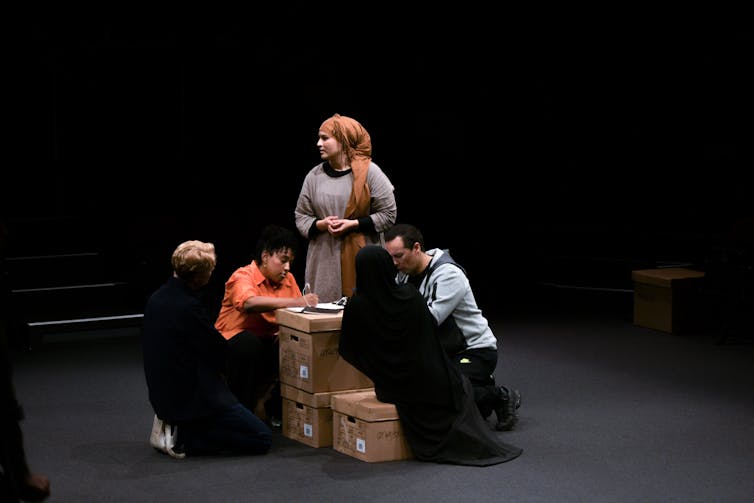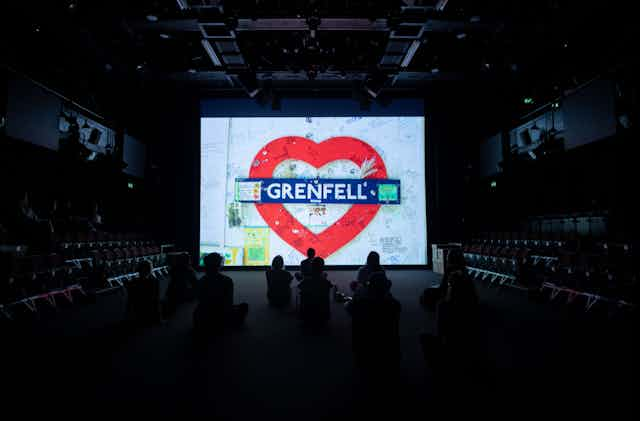The National Theatre’s new play, Grenfell: in the words of survivors, written by Gillian Slovo and directed by Phyllida Lloyd and Anthony Simpson-Pike, aims to offer a voice to survivors of the fire.
This is a “verbatim play”. Often focused on communities that are marginalised or excluded, verbatim theatre emerged in the 1970s. It uses the words of real people as the basis for theatrical performance. The inclusion of “word for word” elements from conversations in these communities allows verbatim to explore a range of social and political issues and offer a voice to unheard perspectives.
On June 14 2017, a fire broke out in Grenfell Tower, a 24-storey residential housing block in North Kensington, west London. The tragedy claimed the lives of 72 residents of the tower. Over the six years since the fire, Slovo has conducted in-depth interviews with survivors and the bereaved, alongside members of the wider community living and working in the shadow of the still-standing shell of the building.
Grenfell expertly combines verbatim performances drawn from first-hand accounts with a film made by the survivors in their ongoing campaign for justice. The play recounts the events leading up to the tragedy and the night of the fire itself as well as the ongoing activities of the communities decimated by its impact.
Also threaded through the play are staged excerpts from the transcripts of the Grenfell Tower Enquiry (2017-22). These integrate the tribunal theatre approach which is often traced to Nicholas Kent and Richard Norton-Taylor’s The Colour of Justice (1999) at the Tricycle (now Kiln) theatre about the racially motivated murder of Stephen Lawrence in 1993.
Grenfell is not the first time the National Theatre has created a performance designed to platform and interrogate urgent issues and tragic events. Its staging of David Hare’s Stuff Happens (2004) used material from the public inquiry to examine the Iraq War. Verbatim commentary taken from interviews with former British Rail employees in Hare’s The Permanent Way(2003) chronicled the disastrous repercussions following the privatisation of the railways.
The challenges facing verbatim theatre
Even with its ideals and dedication to foregrounding truth through the voices of those involved, verbatim methods do raise ethical quandaries.
Creating theatre from the words of “ordinary people” can run the risk of speaking for the marginalised people theatre makers aspire to “give voice” to. Done without sufficient care, verbatim might appropriate their stories, or paint those it apparently “speaks for” only as victims.
Verbatim theatre may lack nuance in its depictions, suspending its subjects in a traumatic moment, or a position of grievance or helplessness. Its necessarily selective approach will also cut some voices out altogether.
Grenfell aspires to navigate these and other challenges by offering the “story weaving” approach described in theatre academic and playwright Amanda Stuart-Fisher’s book Performing the Testimonial (2022):
Personal and communal narratives become layered upon each other, working together in an interconnected process in order to enact a collective story.
The script’s various threads are skilfully sliced and spliced by the creative team, creating an enthralling and deeply affective three-hour piece of theatre that invites the audience into the narrative, emphasising the collective values of Grenfell’s community and seemingly extending them to us.
Among the play’s many strengths are the company’s respectful approach and connection to the survivors they depict, and its care for the audience. Actors introduce both themselves and the characters they are playing. “My words are taken from interviews with Natasha, and with her consent,” actor Pearl Mackie explains. We are warned of what to expect – “there will be no depictions of fire” – and invited to seek help if what is shared is overwhelming.
Never Forget
In this production the tragedy of Grenfell remains understated, leaving room for the audience to fill in the gaps.
The survivors’ remembrances culminate in a sensitive yet truly harrowing account of the catastrophic fire. Movable archive boxes marked with the number of each flat, act as building blocks of various locations in the minimalist set and also contain the sombre relics of the fire. A vacated seating bank, illuminated from above, honours those that were lost.
The skilfully directed ensemble cast demonstrates a love and connection that emulates the mutual care of the Grenfell community, helping each other with on-stage costume changes, and so tight they almost seem to finish each other’s sentences. Each lighting change, each sound effect, is achieved with nuance and meticulous attention to detail that was woefully lacking in the dereliction of duty shown by the authorities to the residents.
In the end, a terrible truth emerges of a shockingly remiss and cost-cutting culture of decision-making, where racism and poverty determined the degree of care and attention residents received.

Our own work on The Verbatim Formula research uses elements of verbatim with communities of young people who have experienced social care. We found that verbatim performance not only provide a platform for voices to be heard, but can also be a powerful form of accountability and a provocation to action.
Grenfell continues the tradition of verbatim theatre as an acute critical and political form that enables the National Theatre to fulfil its unofficial remit for staging “state of the nation” drama.
The audiences remains in the light for much of the play. At the end, they are asked to participate in an act of communal theatre-making that positions each person as an active part of the survivors’ ongoing fight for justice. We too, the survivors tell us, must remember.
Grenfell: in the words of survivors is on at the National Theatre until August 26 2023.

Looking for something good? Cut through the noise with a carefully curated selection of the latest releases, live events and exhibitions, straight to your inbox every fortnight, on Fridays. Sign up here.

